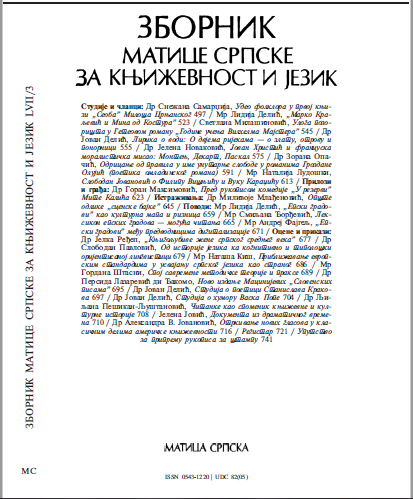УЛОГA ПОЗОРИШТA У ГЕТЕОВОМ РОМAНУ ГОДИНЕ УЧЕЊA ВИЛХЕЛИA MAJCTEPA
THE ROLE OF THE THEATRE IN THE GOETHE’S NOVEL WILHELM MEISTER’S APPRENTICESHIP
Author(s): Svetlana MilašinovicSubject(s): Theatre, Dance, Performing Arts, Comparative Study of Literature, German Literature, Theory of Literature
Published by: Матица српска
Keywords: Wilhelm Meister’s Apprenticeship; Goethe; Theater and poetry;
Summary/Abstract: Through his vision of the theatre and Shakespeare’s most famous play (Hamlet), in the story about the title character of the novel Wilhelm Meister’s Apprenticeship, Goethe emphasizes how theatre and play, and poetry in general are just a small part of the comprehensive mosaic of problems in education, personality development and humanity. Accordingly, the writer makes the Man the central figure of the novel, i.e. his shaping and the betterment of his personality. A man can only improve in his work, and in order to succeed he must turn to education. Therefore, we are free to say that what we see in front of us is an educational novel (germ. Bilgungsroman, a novel seen among the critics as a thin boundary between individualism and romanticism). Goethe’s novel had a permanent influence upon the development of German educational novel. Great storywriters of the 19th and 20th c. Loudwig Pick, Jean Paul, Adalbert Stiftler, Gottfried Keller, Thomas Mann and Hermann Hesse found it both a role model and inspiration.
Journal: Зборник Матице српске за књижевност и језик
- Issue Year: 57/2009
- Issue No: 3
- Page Range: 545-553
- Page Count: 9
- Language: Serbian

